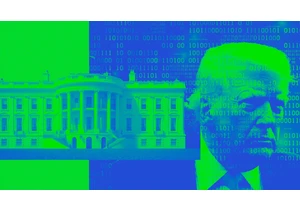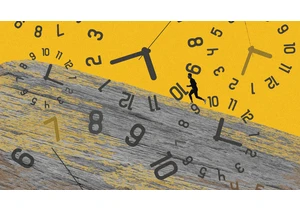President Donald Trump’s bowling-ball attitude to international relations and business was in evidence again this week as he announced a landmark $100 billion deal with Taiwanese computer chip manufacturer TSMC to bring more production capacity to the United States.
The agreement with TSMC plans for five new factories to be built in the U.S., signed alongside TSMC CEO C.C. Wei in the White House on March 3. “We must be able to build the chips and semiconductors that we need right here,” Trump said as he announced the deal. “It’s a matter of national security for us.”
The move to onshore production of the chips that are powering the AI and broader tech revolution may well shore up U.S. national security. But those watching the deal—alongside the stock market, which reacted by lowering the price of TSMC shares—worry that the agreement trades strengthened U.S. national security for weakened Taiwanese security.
“TSMC’s additional $100 billion investment is likely to further expand the U.S. presence in global advanced chip manufacturing, which is currently dominated by Taiwan,” says Ray Wang, a Washington D.C.-based analyst focusing on U.S.-China tech competition and the semiconductor industry in Asia. That’s good news for the United States.
But onshoring the production of advanced computer chips that help power the AI revolution isn’t necessarily good news for Taiwan. “TSMC’s newly announced investment in manufacturing, packaging, and R&D in the United States will likely diminish Taiwan’s strategic importance for the U.S. and broader global economy in the long run,” says Wang. For years, Taiwan has managed to fend off the threat of a Chinese invasion of the small island nation because of its strategic importance as the key global factory for computer chips. It’s an advantage that the Taiwanese dubbed their “Silicon Shield.” Indeed, just days ago, the country’s economy minister, Kuo Jyh-huei, described Taiwan’s semiconductor industry as its “sacred mountain protecting the country.”
Yet that sacred mountain looks a little more surmountable now. “Ultimately it reduces U.S. dependence on Taiwan—which reduces Taiwanese leverage over the U.S.,” says William Matthews, senior research fellow for China and the world in the Asia-Pacific program at Chatham House. Losing that leverage is a dangerous move, Matthews says, not least because of the way the United States has taken a more transactional approach to international relations, even with its allies, under Trump. “From that point of view it reduces the incentive in Washington to defend Taiwan from China,” explains Matthews. “Unlike Ukraine, there isn’t an ongoing war, but Trump’s approach to the mineral deal is indicative of his attitude to international partnerships—transactional and potentially extractive while minimizing costs to the U.S.”
The Taiwanese economics minister said earlier this month that no deal with TSMC would be signed without the express agreement of the government, suggesting that TSMC hasn’t yet granted the ability for U.S. plants to build the highest-spec chips—for now. “The Taiwanese government has said it will retain the most advanced tech but that doesn’t mean that it will do so forever, or that the U.S. won’t leap ahead with access to more advanced chip production on U.S. soil,” warns Matthews. And at that point, there’s little reason for the U.S. to defend Taiwan should the worst happen.
That said, Wang, the tech competition analyst, isn’t certain that it’s a zero-sum game. “This additional investment could also strengthen U.S.-Taiwan relations economically and technologically, first potentially reducing the risk of being targeted by tariffs under the Trump administration and serving as a good start for future collaboration between the two governments,” he says. But Matthews worries that it further isolates Taiwan geographically and could result in real worries in the Asia-Pacific region, where China has long threatened to invade Taiwan.
“The risk for Taiwan is that China’s approach is not one that prioritizes a war outside specific circumstances—the declaration of formal independence or action taken by Taiwan or the U.S. that puts eventual unification in jeopardy,” says Matthews. Instead, Matthews foresees there could be “a long game of increasing grayzone activities like joint air and naval patrols, cyberattacks, and cable cutting, with an aim of wearing down Taiwan’s resolve.” Such asymmetrical actions that come below the point of outright military intervention make it less and less likely that Trump would intervene now that much of the chip production the U.S. relies on Taiwan for has been onshored—but ratchets up the tension nonetheless.
It also gives China time to muster forces further—much as happened in Ukraine with Russia. “All of this means that if and when China does take the step to occupy Taiwan, the costs of U.S. involvement will be much greater,” says Matthews. “If all goes to China’s plan, the U.S. will decide not to get involved in a conflict it could lose, and will be even less inclined to do so if the material incentive of protecting Taiwan’s chip sector is gone.”
Войдите, чтобы добавить комментарий
Другие сообщения в этой группе

Welcome to AI Decoded, Fast Company’s weekly newsletter that breaks down the most important news in

The data nerds are fighting back.
After watching data sets be altered or d

Chris Guillebeau spent years racing against time, visiting all 193 countries before he turned 35, hosting annual gatherings of thousands, and writing bestsellers like The $100 Startup. Bu

As my family settles into a whole new city and community, I’ve been eagerly exploring a variety of sites and services for discovering new gems and getting to know our area. And while our recent cr


If you can’t afford a lawyer, it turns out there’s nothing stopping you from sending a scary-looking letter that, at first glance, seems to come from one—and hoping the recipient doesn’t read the

